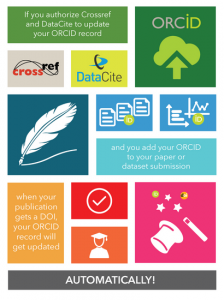Five ways to be proactive about ORCID
What better time? ORCID, CrossRef and DataCite announced yesterday that they will be working together to automatically update researcher ORCID records when Crossref or DataCite receives relevant data that includes an authenticated ORCID iD. Here are some suggestions on how Editorial Manager and ProduXion Manager users can ensure that they are receiving the full benefit of this new functionality.
 1) Configure! In Editorial Manager, ORCID configuration options include: hidden which gives researchers no prompt, or specific field, to enter their ORCID into the system; optional allows the system to display the field where an ORCID could be entered and authenticated; required means that for a specific article type entering an authenticated ORCID for authors, and optionally co-authors, is required – another approach is to require ORCID at registration.
1) Configure! In Editorial Manager, ORCID configuration options include: hidden which gives researchers no prompt, or specific field, to enter their ORCID into the system; optional allows the system to display the field where an ORCID could be entered and authenticated; required means that for a specific article type entering an authenticated ORCID for authors, and optionally co-authors, is required – another approach is to require ORCID at registration.
2) Start verifying! If ORCID entry is optional for authors and co-authors, it is beneficial to put safeguards in place to ensure that ORCID iDs entered on behalf of others are authenticated. Configuration is easy, and it gives you a great reason to get in touch with your account coordinator!
3) Simplify by configuring Single Sign On using ORCID. For an ORCID-friendly journal, this is a no-brainer because it allows users to log in across configured sites with just one set of credentials – and this includes cross-publisher!
4) Make it count! Looking to make ORCID one of the metadata elements that travels through the workflow (and ecosystem) with articles? Best be using ProduXion Manager – the only production tracking system that supports ORCID in ProduXion workflows as a field, as well as in the JATS XML export.
5) Give yourself a gold star! These things make life much easier for authors – especially those savvy enough to enable their ORCID records to receive record updates from Data Cite and CrossRef! No worries if they aren’t into that, they can opt out just as easily. And as an ancillary benefit, journals and publishers get value from the authenticated identity metadata that the iD provides, enriching not just the publication itself, but ultimately, the entire research ecosystem.

